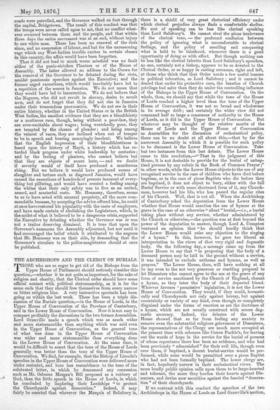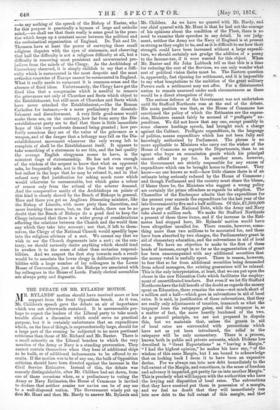'THE ARCHBISHOPS AND THE CLERGY ON BURIALS.
THOSE who are so eager to get rid of the Bishops from the Upper House of Parliament should seriously consider this question,—whether it be not quite as important, for the sake of religion and charity, that the Clerical order should have some official contact with political statesmanship, as it is for the same ends that they should free themselves from every narrow or bitter religious bias. A very instructive spectacle has been going on within the last week. There has been a triple dis- cussion of the Burials question,—in the House of Lords, in the Upper House of Convocation of the Province of Canterbury, and in the Lower House of Convocation. Now it is not easy to
• corapare profitably the discussions in the two former Assemblies. Lord Granville made a speech which was as much wider and more statesmanlike than anything which was said even in the Upper House of Convocation, as the general tone of what was done in the Upper House of Convocation was wider and more statesmanlike than everything done in the Lower House of Convocation. At the same time, it would be difficult to assert that the tone of the House of Lords generally was better than the tone of the Upper House of Convocation. We find, for example, that the Bishop of Lincoln's speeches in the Upper House of Convocation were delivered more under restraint, and bore less resemblance to the tone of the celebrated letter, in which he denounced any concession such as Mr. Osborne Morgan's Bill proposed as a robbery of God, than the little speech in the House of Lords, in which he concluded by imploring their Lordships "to protect the Churchyards against desecration." Indeed, it may fairly be asserted that wherever the Marquis of Salisbury is, ,
there is a shield of very great rhetorical efficiency under which clerical prejudice always finds a comfortable shelter. No sort of speaking can be less like clerical speaking than Lord Salisbury's. He cannot rival the pima irrelevance of the clerical tone, — the' profound confusion between the policy of ignoring what is uncomfortable to clerical feelings, and the policy of assailing and conquering what is held to be falsehood, whenever there is a good opportunity of doing so with effect. But though nothing can be less like the clerical falsetto than Lord Salisbury's speeches, no one, certainly not a bishop, appears to be so devoted to the Clerical Order, or so happy in casting sarcasms, right and left, at those who think that that Order needs a few useful lessons in political• toleration, as Lord Salisbury ; and it cannot be denied that under his protective care, the fanatics of Church privilege feel safer than they do under the controlling influence of the Bishops in the Upper House of Convocation. On the whole, then, we should say that while the tone of the House of Lords reached a higher level than the tone of the Upper House of Convocation, it was not so broad and wholesome in its average drift ; and certainly the wider view did not command half so large a consensus of authority in the House of Lords, as it did in the Upper House of Convocation. But whatever may be thought of the relative merits of the House of Lords and the Upper House of Convocation as Assemblies for the discussion of ecclesiastical policy, there can be no doubt at all about this,—that by far the narrowest Assembly in which it is possible for such policy to be discussed is the Lower House of Convocation. Take but two instances from this last debate. The Lower House came to this resolution,—" That in the judgment of this House, it is not desirable to provide for the burial of unbap- tised persons by any rubric in the Book of Common Prayer ;" in other words, while the Lower House objects to the use of any recognised service in the case of children who have died before baptism, or in the case of pious Baptists who die before they are baptised, it does not object to bury, either with the full Burial Service or with some shortened form of it, any Church- man however bad his life, who has passed the regular rites of his Church. Well, that is not all. When the Archbishop of Canterbury asked the deputation from the Lower House whether that House would sanction the use of hymns at the grave in the case of an otherwise" silent " burial,—i.e., a burial taking place without any service, whether administered by the Church or otherwise,—the question was at first beyond the power of the deputation to answer, though Lord A. Comptoti ventured an opinion that "he should hardly think that the Lower House would raise any objection to the singing of a hymn." In this, however, he gave too liberal an interpretation to the views of that very rigid and dogmatic body. On the following day, a message came up from the Lower House to say that "in proposing that the body of a deceased person may be laid in the ground without a service, it was intended to exclude anthems and hymns, as well as prayers." The Lower House, then, will have nothing at all to say even to the not very generous or startling proposal to let Dissenters who cannot agree to the use at the grave of any form of service sanctioned by the Church of England, chaunt a hymn, as they inter the body of their departed friend. Whoever favours ' permissive ' legislation, it is not the Lower House of Convocation. They would, if they could, hermeti- cally seal Churchyards not only against heresy, but against eccentricity or variety of any kind, even though so completely disguised under the forms of emotion as are the doctrines of a hymn, which are not usually construed with severe dog- matic accuracy. Indeed, the debates of the Lower House showed that so far from feeling any anxiety to remove even the substantial religious grievances of Dissenters, the representatives of the Clergy are much more occupied at the present time with schemes like Canon Puckle's for leaving out the words of hope in the service for the burial of persons of whose repentance there has been no evidence, and who had been previously "admonished" for their evil life, though even over them, if baptised, a decent burial-service would be per- formed, while none would be permitted over a pious Baptist who had not been formally baptised. The lower clergy are, in fact, hopelessly narrow in their ecclesiastical views. The more loudly public opinion calls upon them to be large-hearted and tolerant, the more they harden their hearts against Dis- senters, and devise new securities against the fancied "desecra- tion " of their churchyards.
If we contrast with this conduct the speeches of the two Archbishops in the House of Lords on Lord Granville's motion,
—to say nothing of the speech of the Bishop of Exeter, who for this purpose is practically a layman of large and catholic mind,—we shall see that there really is some good in the prac- tice which keeps up a constant ciexus between the political and the ecclesiastical organisation of England. Dr. Tait and Dr. Thomson have at least the power of surveying these small religious disputes with the eyes of statesmen, and observing that half the difficulty is not a religious difficulty at all but a difficulty in removing most persistent and unwarranted pre- judices from the minds of the Clergy. As the Archbishop of Canterbury observed, it is simply childish to say that a diffi- culty which is surmounted in the most despotic and the most orthodox countries of Europe cannot be surmounted in England. What it really needs to surmount it is common-sense and the absence of fixed ideas. Unfortunately, the Clergy have got the fixed idea that a compromise which is needful to remove the grievances not only of Churches and Sects which object to the Establishment, but still more of Churches and Sects which have never attacked the Establishnient,—like the Roman Catholics for instance,—is a mere preliminary for disestab- lishment and disendowment. A very little good-sense would make them see, on the contrary, how far from sorry the Dis- establishment party are to find that there is little immediate lope of this very moderate demand being granted ; how per- fectly conscious they are of the value of the grievance as a weapon, and of the danger that a lethargy may fall on the Dis- establishment movement whenever the only wrong left to complain of shall be the Establishment itself. It appears to Lake something of a statesman to see this, and the last quality the average English clergyman seems to have, is the minutest tinge of statesmanship. He has not even enough of the wisdom of the serpent to know that what an opponent asks, he frequently asks, not in the hope that he may get it, but rather in the hope that he may be refused it, and in that refusal may find justification for asking much more which would otherwise be unreasonable, but which gains a colour of reason only from the refusal of the soberer demand. And the comparative sanity of the Archbishops on points of this kind is clearly shared by the Bench of Bishops in general. Here and there you get an Anglican Dissenting minister, like the Bishop of Lincoln, with more piety than discretion, and more learning than sense, but, on the whole, there can be no doubt that the Bench of Bishops do a good deal to keep the Clergy informed that there is a wider group of considerations -affecting the relations between the Church and the world than any which they take into account ; nor that, if left to them- selves, the Clergy of the National Church would speedily lapse into the religious advisers of a sect. We cannot say that we wish to see the Church degenerate into a sect ; on the con- trary, we should earnestly desire anything which should tend to awaken it to the sense of other than sectarian responsi- bilities. And we suspect the first step towards such a result would be to associate the lower clergy in deliberative responsi- bilities with a large number of lay colleagues in the Lower House of Convocation, just as the Bishops are associated with lay colleagues in the House of Lords. Purely clerical assemblies are always petty and dogmatic.































 Previous page
Previous page